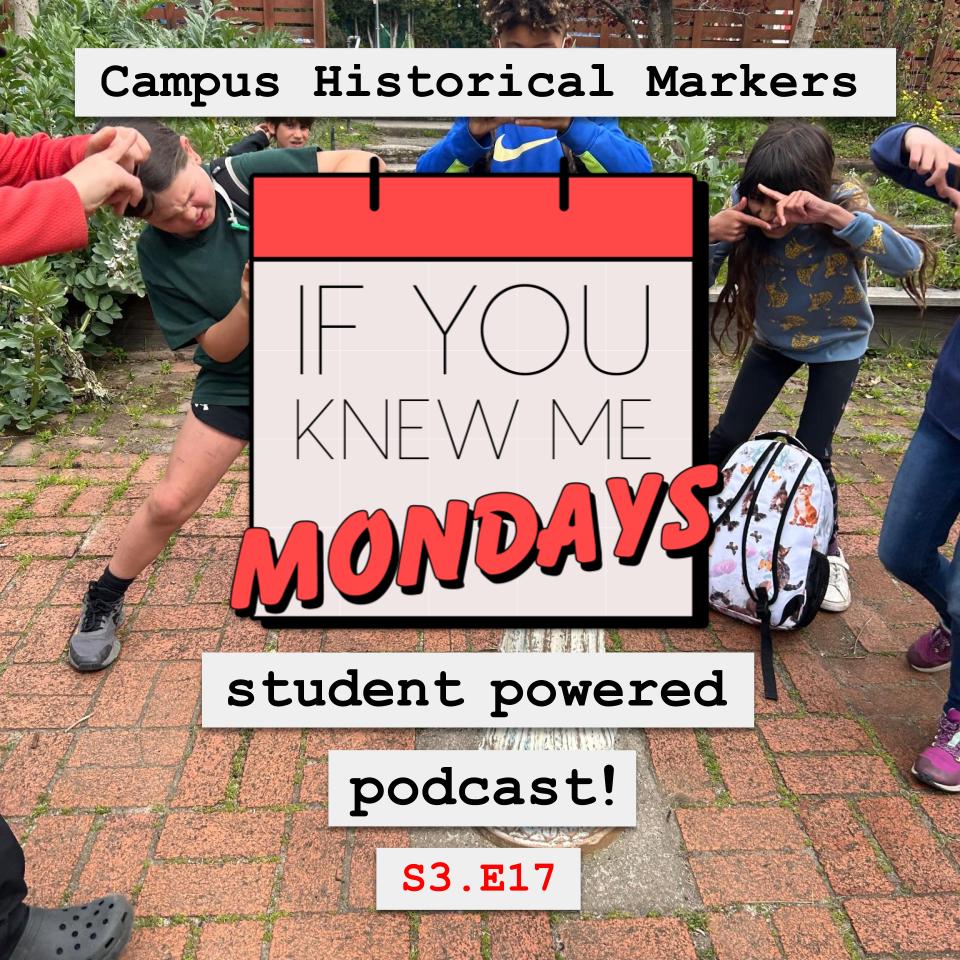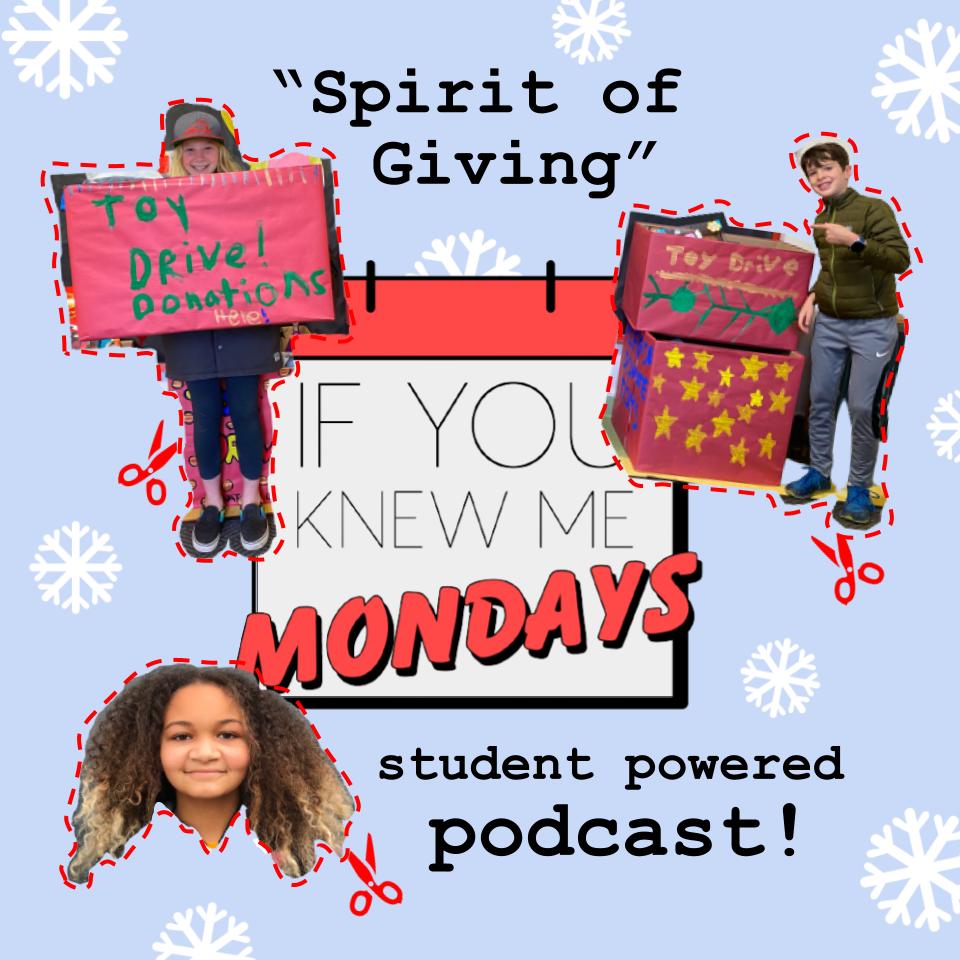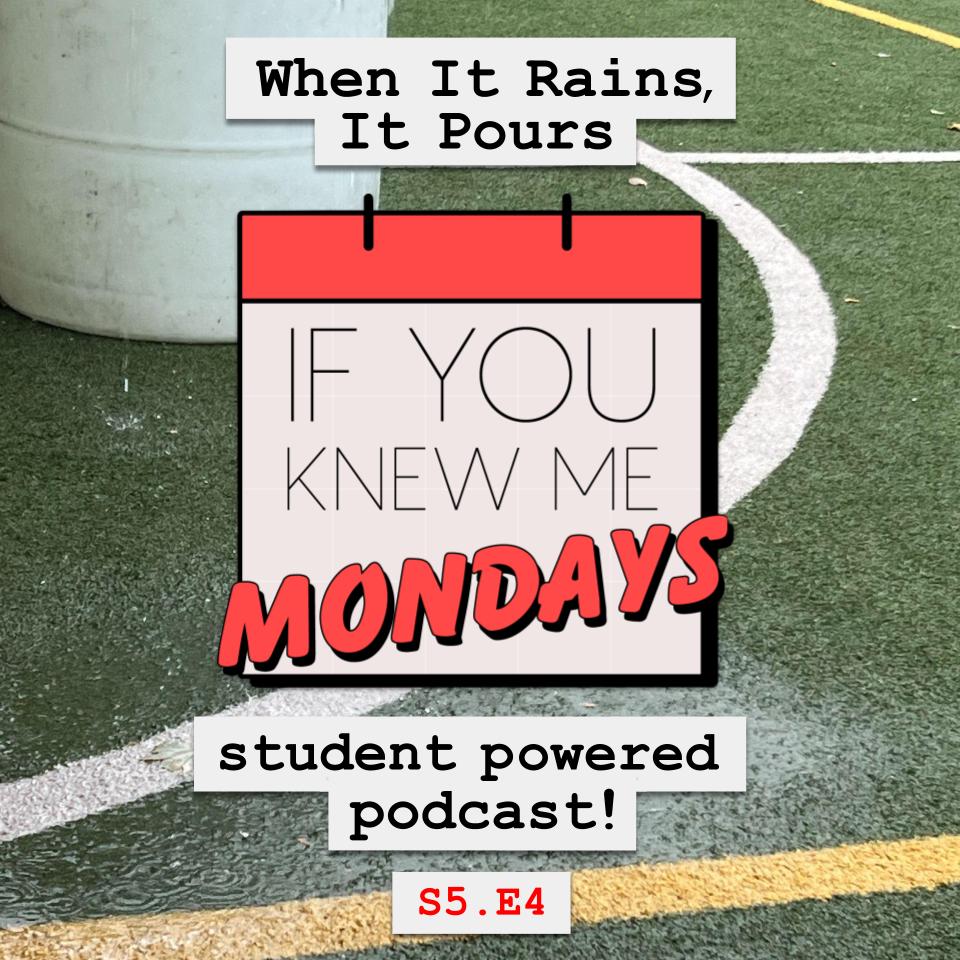Episode Transcript
[00:00:01] Speaker A: Amazing. I think the chickens are loving the gon.
[00:00:06] Speaker B: If you really knew me if you really knew me if you really knew.
[00:00:11] Speaker A: Me if you really knew me you.
[00:00:13] Speaker B: Would know hey, who are you? Who, me? Yeah, you.
[00:00:17] Speaker C: It's Monday.
[00:00:22] Speaker D: Hello, and welcome to if you Knew me Monday, a student powered Park Day inspired podcast that builds belonging by sharing stories and perspectives from the margins of our school and community.
[00:00:32] Speaker B: Say what?
[00:00:34] Speaker D: My name is Arjuna Said, park Day's director of equity, inclusion, and belonging. And I'm here today to welcome you to our fourth season of Ifinui Mondays.
Since we began as an experiment in response to navigating the remote and hybrid learning environment in those early days of the pandemic, we've been using the power of a good question to explore what makes us who we are as individuals and as a community.
This season, along with grade level podcast clubs, and collaborative storytelling projects, if you knew me Mondays will also be a platform for our 6th grade justice, equity, diversity, and inclusion class, otherwise known as Jedi.
This entire school year, 6th grade Jedi will be exploring a wide range of topics related to media. Students will be learning to deconstruct media messages, and they'll be developing their own views that highlight their values and inspire action in our community.
You'll be hearing plenty from students this year, but today I'll be getting us started by sharing the backstory of one of Park Day's newest K eight community traditions. If you haven't heard, Park Day has a new gong to inspire our collective mindfulness. And today I'll be stopping by the classroom of our lower school music teacher, Jackie Rago, to find out how she's using the gong in her classroom and how she's sharing it with our whole community this school year. Here she is.
[00:01:56] Speaker A: Now, I am a fan of collecting instruments that have different kinds of sounds. So you've been in my studio.
[00:02:06] Speaker D: The world is represented.
[00:02:07] Speaker A: Yeah, a lot of instruments. And my travels around the world, I think, besides family and fun, has to do maybe 80% with music. So wherever I go, I try my best to make a little time to visit the music store of that village or that town.
Or if there is a museum, I go to the museum and check culturally what's happening. And if I can bring an instrument with me, great.
[00:02:40] Speaker D: And then we started talking about gongs.
[00:02:42] Speaker A: So in terms of gongs, specifically, I love sound design and soundscapes. So gongs are very special for filling a space where nothing else can be played. It's that long resonance that stays.
I find that so special.
So all these things that I'm telling you have to do with a purpose.
And also, when we were doing COVID through zoom, I was so frustrating. Nothing can be done in terms of clapping together or keeping the beat. And then that's when I started the healing power of music and the healing power of music has to do with finding something that teaching through zoom was engaging. And then I started to do the bell, and I had those two little gums, and I curated lessons, and it made me think that the soothing experience of listening to a long tone right in that moment where we were so distracted by negative news and feelings around COVID, it actually helped a lot. It helped me, and it helped the kids and the teachers who were present in those lessons.
[00:04:16] Speaker D: I very much remember that time Jackie's talking about, and I had no idea that the pandemic inspired her Healing Sounds of Music curriculum. I can totally relate because, as I mentioned earlier, the Impacts of COVID originally inspired this very podcast.
[00:04:30] Speaker A: My goal is that the sound of music, especially with these kind of sound healing instruments, can help all of us to find a moment of mindfulness and breathing.
And also, it's humble. It's a humble moment, and at the same time, it's a moment of truth when you find that space where you just don't say, don't think, just listening.
[00:05:06] Speaker D: After this conversation, I came back to Jackie's class to hear her introduce the gong to her third and fourth grade classes and to see the healing power of music for myself.
[00:05:16] Speaker A: So can everybody sit comfortable like crisscross applesauce, not crossing arms or just relax and raise your hands, close your eyes, touch the ground when the sound of the gong disappears.
[00:05:38] Speaker C: Right now.
[00:05:42] Speaker A: We have a high pitch one, a higher pitch one, and a lower pitch one. So your job is to when you listen to it, think about time and length, which one rings longer, and you're going to determine that by the feeling of how long you kept your arms going from up down to touching the earth. Okay, here it goes. Close your eyes.
[00:06:14] Speaker C: You it's.
[00:06:40] Speaker B: For me, what the gong feels like. It feels like if I had so many thoughts in my head and I just listen a few times to it is like all my thoughts float away like a cloud.
It kind of makes you feel peaceful about it. And the sound of the gong, all the different high pitched and low pitched sounds of it, really is amazing.
[00:07:16] Speaker E: I think the gong calmed most of us down because we came in here with such a rush coming in through the door, and then we came here. Maybe doing the gong every day would be a good thing for us.
[00:07:32] Speaker B: I just think it's crazy how that gong can make so many different sounds and how there are so many different kinds of gongs.
It's really nourishing and relaxing.
It gets you in kind of a calm spot. I listen to meditation, and there's a lot of gongs in it.
[00:07:58] Speaker A: We have frequencies. That means that we human beings. We have frequencies. Sometimes we are excited, sometimes we're in a high level, sometimes we're in a middle level. Sometimes we are more like quieter. So I find music and these instruments exactly, like, very much related to how I feel, or they can make me come down.
[00:08:25] Speaker B: The gong and its music then migrated from China to Indonesia by the 9th century.
[00:08:35] Speaker A: We're going to just look at this lady making gongs from Indonesia, which look a little bit different. What is the difference of these gongs? And this one, Luna?
[00:08:52] Speaker B: Well, the one that she's holding in her hand is well, it's smaller.
[00:09:04] Speaker D: And now here's Jackie talking about the importance of cultural humility in her teaching practice.
[00:09:09] Speaker A: One thing that is really important for me as a music teacher is whenever I present something, whether it's a song, an instrument, anything cultural, if I have no information about it, I will wait until I have at least the minimum amount of information, foundation of who, where, how, why?
Those four questions.
As long as they know where in the map this is coming from who, what is the purpose of whatever I'm presenting, whether it's an instrument, a song, and how can we, with all respect, use it in our room?
That's my purpose. Like open everybody's eyes, ears, hearts, and spirits to receive receive the world out there through music and musical instruments and culture.
[00:10:10] Speaker D: I have to say, it was pretty amazing seeing the undeniable calming effect that the gong had on Jackie's students. Here's Jackie talking about how her practice of using the gong in her class ended up at our all school assembly, which you'll hear in just a moment.
[00:10:25] Speaker A: Angela and I talked. She asked me a year ago by checking in, how was the year for you? What is your I said, well, my input is that I would love if we have a current world map in as many rooms as possible and a gong for the school. Those were my two inputs.
[00:10:48] Speaker D: Well, thanks to Jackie, Park Day now has an official school gong. And here's what it sounded like when it was finally introduced to our students.
[00:10:56] Speaker A: We are establishing a new Park Day tradition today, and we're pretty excited about it.
[00:11:02] Speaker B: Welcome, everyone, to our special assembly. Today. We are going to begin with a mindful moment.
Let's start by listening carefully to the sounds of nature and everything around us. Don't forget to notice the silence, too.
Now please close your eyes, take a deep breath and focus on the sound of the mindful bell.
Today is unique because we will experience another mindful moment with a new musical instrument.
[00:11:37] Speaker A: Please welcome our music teacher, Jackie, who will introduce our new Park Day school gong.
[00:11:50] Speaker C: Thank you.
[00:11:51] Speaker A: Thank you, everyone.
So if you can look at this beautiful instrument that we are going to present today. And before we play it, I want to say something important about mindfulness.
Mindfulness is like magic. It helps us feel calm and happy when we have an opportunity to experience mindfulness with music.
That's what we call the healing power of music.
Are you ready to experience the healing power of music and mindfulness one more time with the introduction of our beautiful part day gone? Give me thumbs up.
Raise your hands, take a deep breath. And then when the sound of the gone fades, you touch the ground. And really literally, we're touching mother earth gently, softly, and bringing all love and good, positive energy. So here we go. This is going to be our first part day gong sound. Make it special. Put it in your heart, in your mind.
Thank you so much for this mindful moment.
We can feel each one of you, and our gong is going to be present in many gatherings and special events, so expect more gong music and mindfulness.
[00:14:01] Speaker D: All right, in case you didn't catch that, that was our entire student body and staff gathered in silence on the field during one of our Friday assemblies.
Just like with her third grade class, the healing power of the gong was undeniable. Maybe you even felt it yourself listening to this episode during the course of our busy school days, taking time to be present with our thoughts and feelings and our bodies is so important. I want to thank Jackie once again for welcoming us into our classroom and for bringing the healing sound of music to our entire school community. And of course, I want to thank you as well for tuning in to our first episode of season four of If You Knew Me Mondays. If you haven't already, be sure to subscribe wherever you listen to podcasts so you're sure not to miss any of our upcoming episodes. Thank you again for tuning in and we'll catch you next time on If You Knew Me Mondays.
Oh, by the way, keep listening to hear Jackie's fourth grade class play an assortment of gongs for the very first time.
[00:15:48] Speaker C: Sam SA it.
[00:17:10] Speaker B: I think.


